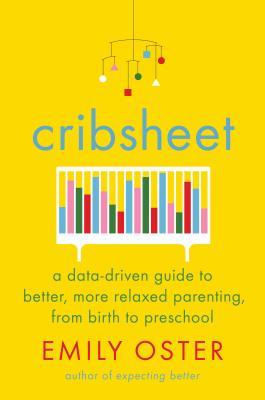Emily Oster

Expecting Better: Why the Conventional Pregnancy Wisdom is Wrong - and What You Really Need to Know
Emily Oster
What to Expect When You're Expecting meets Freakonomics: an award-winning economist disproves standard recommendations about pregnancy to empower women while they're expecting.
Pregnancy—unquestionably one of the most profound, meaningful experiences of adulthood—can reduce otherwise intelligent women to, well, babies. Pregnant women are told to avoid cold cuts, sushi, alcohol, and coffee without ever being told why these are forbidden. Rules for prenatal testing are similarly unexplained. Moms-to-be desperately want a resource that empowers them to make their own right choices.
When award-winning economist Emily Oster was a mom-to-be herself, she evaluated the data behind the accepted rules of pregnancy and discovered that most are often misguided and some are just flat-out wrong. Debunking myths and explaining everything from the real effects of caffeine to the surprising dangers of gardening, Expecting Better is the book for every pregnant woman who wants to enjoy a healthy and relaxed pregnancy.

Cribsheet: A Data-Driven Guide to Better, More Relaxed Parenting, from Birth to Preschool
Emily Oster
From the author of EXPECTING BETTER, an economist's guide to the early years of parenting
With EXPECTING BETTER, award-winning economist Emily Oster spotted a need in the pregnancy market for advice that gave women the information they needed to make the best decision for their own pregnancies. By digging into the data, Oster found that much of the conventional pregnancy wisdom was wrong. In CRIBSHEET, she now tackles an even great challenge: decision making in the early years of parenting.
As any new parent knows, there is an abundance of often-conflicting advice hurled at you from doctors, family, friends, and the internet. From the earliest days, parents get the message that they must make certain choices around feeding, sleep, and schedule or all will be lost. There's a rule--or three--for everything. But the benefits of these choices can be overstated, and the tradeoffs can be profound. How do you make your own best decision?

The Family Firm: A Data-Driven Guide to Better Decision Making in the Early School Years (The ParentData Series)
Emily Oster
The instant New York Times bestseller!
“Emily Oster dives into the data on parenting issues, cuts through the clutter, and gives families the bottom line to help them make better decisions.” –Good Morning America
“A targeted mini-MBA program designed to help moms and dads establish best practices for day-to-day operations." - The Washington Post
From the bestselling author of Expecting Better and Cribsheet , the next step in data driven parenting from economist Emily Oster.
In The Family Firm , Brown professor of economics and mom of two Emily Oster offers a classic business school framework for data-driven parents to think more deliberately about the key issues of the elementary school, health, extracurricular activities, and more.
Unlike the hourly challenges of infant parenting, the big questions in this age come up less frequently. But we live with the consequences of our decisions for much longer. What's the right kind of school and at what age should a particular kid start? How do you encourage a healthy diet? Should kids play a sport and how seriously? How do you think smartly about encouraging children's independence? Along with these bigger questions, Oster investigates how to navigate the complexity of day-to-day family logistics.
Making these decisions is less about finding the specific answer and more about taking the right approach. Parents of this age are often still working in baby mode, which is to say, under stress and on the fly. That is a classic management problem, and Oster takes a page from her time as a business school professor at the University of Chicago to show us that thoughtful business process can help smooth out tough family decisions.
The Family Firm is a smart and winning guide to how to think clearly--and with less ambient stress--about the key decisions of the elementary school years.
Parenting is a full-time job. It's time we start treating it like one.